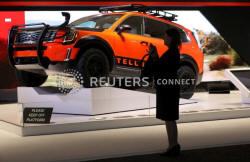Major automakers fear Trump 'grenade' - imposing U.S.
auto tariffs
 Send a link to a friend
Send a link to a friend
 [April 18, 2019]
By Nick Carey and David Shepardson [April 18, 2019]
By Nick Carey and David Shepardson
NEW YORK (Reuters) - Major automakers are
bullish on the outlook for the U.S. economy and auto sales, but one big
question remains - will President Donald Trump throw a grenade into the
sector by imposing sweeping tariffs of up to 25 percent on car and auto
parts imports?
The industry is in "wait-and-see mode," but the tariffs would be a bad
idea, Bob Carter, head of U.S. sales at Toyota Motor Corp, told Reuters
on Wednesday.
"If the tariff happened on the auto industry, quite frankly that's
pulling the pin out of the grenade," he said at a conference on Tuesday
held in conjunction with the New York International Auto Show. "I don't
believe the U.S. economy can run out of the room fast enough if that
happens."
Carter said in an interview he was optimistic the Trump administration
would decide against tariffs, yet "uncomfortable" given the president's
decision last year to impose tariffs on steel and aluminum imports.

Trump ran for office in 2016 on a protectionist platform aimed at
shoring up U.S. manufacturing jobs. He has said in the past he was
considering tariffs on autos and auto parts of up to 25 percent.
In February, the U.S. Commerce Department sent recommendations to Trump,
which auto industry officials expect to include at least some tariffs on
fully assembled vehicles or on critical technologies and components
related to electric, automated, connected and shared vehicles.
Such tariffs would have a deeper impact on car prices and consumers than
earlier metals tariffs that were imposed. The steel and aluminum tariffs
cost Detroit automakers General Motors Co and Ford Motor Co $1 billion
each and Fiat Chrysler Automobiles NV said they could add up to $350
million in costs in 2019.
HEAVY LOBBYING
Trump is supposed to make a decision by mid-May, but some officials
think the administration will find a way to delay final action, using
the threat as leverage to try to win concessions on autos in trade talks
with Japan and the European Union.
Joe Eberhardt, chief executive of Jaguar Land Rover North America, said
a 25 percent tariff on all imported vehicles would cost the company
"billions." If the tariffs were on parts, it would also hit U.S.
automakers hard, he noted.
"We just hope that reason will prevail," he said.
[to top of second column] |

A woman photographs cars on display at the 2019 New York
International Auto Show in New York City, New York, U.S, April 17,
2019. REUTERS/Brendan McDermid/File Photo

Toyota and other automakers have been lobbying heavily to block any new tariffs
on imported vehicles, arguing the industry's global supply chain is so
intertwined that tariffs would raise prices, hurt sales and thus damage the
economy.
IMPACT ON PRICES
At a conference held ahead of the New York auto show this week, IHS Markit's
chief U.S. economist, Joel Prakken, forecast 2019 U.S. new vehicle sales of 16.8
million units, down about 500,000 units from 2018 but still high historically.
However, tariffs could reduce sales by another 2 million vehicles and shave half
to two-thirds of a percentage point off U.S. gross domestic product, he said.
"It would be horrible for the automotive industry, it will be horrible for
consumers and it will be horrible for the U.S. economy," said Fred Diaz, the
U.S. chief executive of Mitsubishi Motors Corp.
In one example, Carter said 72 percent of the parts for the Camry sedan that
Toyota makes in Kentucky come from U.S. suppliers, but 28 percent are imported.
A 25 percent tariff would cause that car's price to rise $1,800 overnight.
"There is no such thing as a 100 percent U.S. vehicle," he told Reuters.
According to industry estimates, broad tariffs could add an average of $4,000 to
a new car's sticker price.
Nissan Motor Co Ltd's North American chairman, Jose Valls, said the automaker
has "invested very heavily in the U.S. and they (the Trump administration) need
to take into account our customers and our employees."
"We'll adjust," Valls said. "But we're not taking decisions on things that
haven't been finalized yet."

Mitsubishi's Diaz said industry groups are lobbying hard against the tariffs.
"The feedback is that we're being heard," he said. "But fundamentally, how do
you really know?"
(Reporting by Nick Carey and David Shepardson in New York; Editing by Ben
Klayman and Matthew Lewis)
[© 2019 Thomson Reuters. All rights
reserved.] Copyright 2019 Reuters. All rights reserved. This material may not be published,
broadcast, rewritten or redistributed.
Thompson Reuters is solely responsible for this content. |